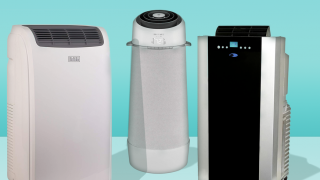Portable air conditioners are portable, easy-to-carry power-powered coolers. They normally come on casters and are not fixed into any surface. Some can be used for heating and dehumidification. They are commonly referred to simply as “air conditioners” or “portable air conditioning units”. These units can be electrically or mechanically controlled and run on Freon or other refrigerant gas.
These units can be easily moved from one room to the next by pulling a handle. You can maximize the cooling effect in areas that have a roof or window that lets in fresh air. In some cases, however, it may be necessary for the portable air conditioner to be kept outdoors if the temperature is below freezing. Otherwise, the unit will only be providing cooling air and not cooling off the entire house or building. A small window unit will suffice for indoor applications since most portable air conditioners don’t run at maximum capacity.
There are many things to consider when selecting the Freon cooling unit. First and foremost are the room size of the individual using the unit. The Freon cooled area will be used next. If the individual rarely uses the unit, a small single stage model would be appropriate. A portable, mid-sized, single stage Freon conditioner is best if the Freon cool user uses the unit regularly.
Window units are available in several models. Most are low profile, but some have higher profile units that offer better cooling coverage. Units with higher temperatures also have better efficiency rates. It is important to make sure that the Freon is working properly before installing the cooling unit inside the home or business. Many manufacturers offer replacement warranties and special servicing for portable air conditioners.
A second consideration when purchasing Freon cooled air conditioning units is the moisture factor. Freon, like all other air conditioning units, must be kept indoors if the humidity levels are high. An indoor window unit may be necessary in areas with seasonal rainfall. A portable air conditioner with a dry/wet sensor might be the best option in areas with low humidity. These units detect moisture when there is a drop in relative humidity. This is usually the case during spring and fall when trees shed their leaves.
Indoor Freon window conditioners can be more expensive than outdoor models. This is why it is important to consider the Freon type used in indoor units. The original indoor Freon unit was made from polyethylene pvc. This Freon dries out after only a few hours. Today, a variety of synthetic fibers have been developed that are highly effective in trapping heat and thus in keeping the room temperature warm. These fibers can also act as insulators, providing additional resistance to cold air in winter. The downside to using synthetic fibers is that they are more expensive than PVC.
Another thing to consider when purchasing a portable air conditioner is how easy it is to keep the unit clean. Many people find that the easier they make it to clean the unit, the longer the unit will last. A high-efficiency unit that runs on electricity requires very little cleaning in order to operate at its optimal performance level. If you don’t want to spend the effort and time required to maintain your portable AC unit, you might consider buying a manual coolant. This coolant must be added to the unit at least once per month.
Many people are still unsure whether to buy a wall-mounted or window unit. They would generally agree that a portable air conditioner is the best choice for their homes. The indoor unit should be dust- and debris-free and not have any odors if it is properly installed and covered. Wall-mounted units, however, must have the air ducts run through walls. This could lead to foul odor problems.
